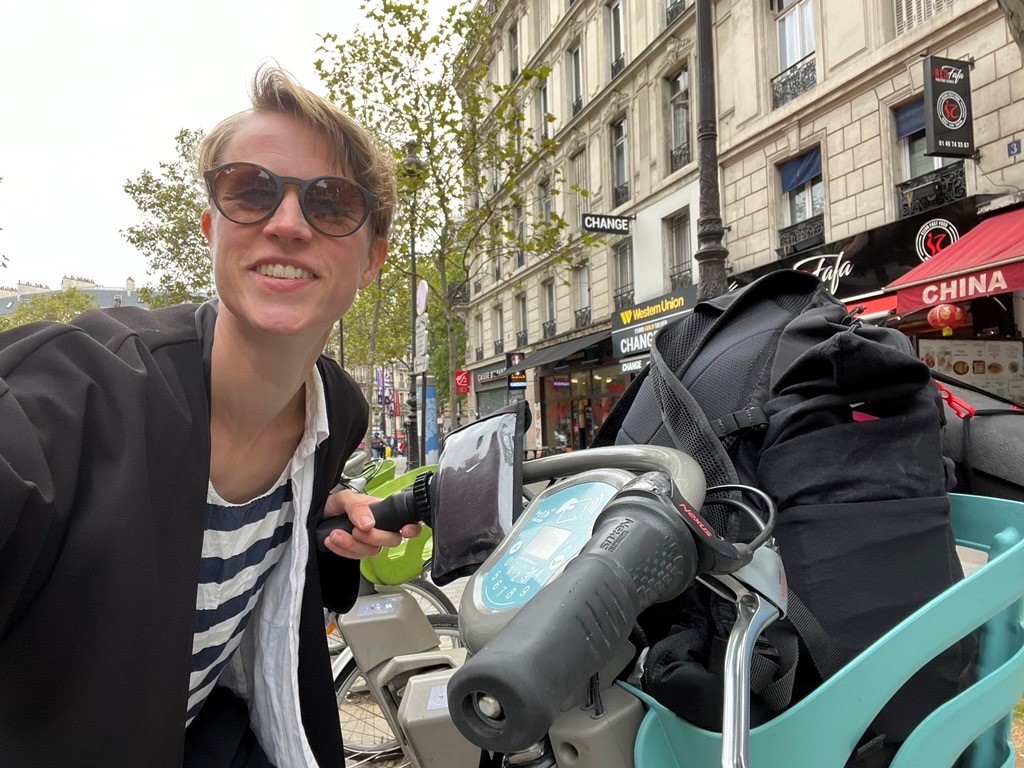On the lookout for the future – along the train tracks
At the beginning of autumn, I made a different trip: train to Barcelona instead of flying. It worked – but not without challenges. The travel agency was unable to book trains outside the Nordics, and Europe's train booking system is not connected. Nevertheless, it was a trip filled with new meetings and insights, something I have never experienced in an airplane seat.

Of course it took longer. But perhaps it is precisely the time that needs to be reevaluated. We no longer live in a world where we can fly for SEK 99 to London over a weekend. In the age of the climate crisis, it is easy to get caught up in what we have to give up, but what can we gain instead? What did the train trip give me that a plane trip never could?
As autumn draws to a close, I have four insights from the trip that remain with me:
Systems thinking without foresight
At conferences in both London and Barcelona, I notice a recurring theme: systems thinking is central, but foresight is conspicuous by its absence. We put a lot of energy into mapping how the world works today – how economies, societies and natural resources are connected – but often fail to ask what the world might look like in 50 years. What if climate change affects how we grow food, transport ourselves or organize our societies?
An example that stuck is Catalonia's work with transformative innovation policy. They are good at mobilizing actors around common objective, but there is a lack of an analysis of how the region's agriculture and water supply can change drastically in the future. Several actors highlight incredible system mapping tools. No one mentions foresight. No one puts a layer of foresight on their mappings. It is not just a piece of the puzzle that is missing. It's like trying to put a puzzle with the wrong pieces in the box. No matter what you do, it won't work. Without a foresight layer on system mapping and analysis, we risk changing existing systems that are not robust to handle future uncertainties.
Here, I think Sweden can play an important role. At conferences like the ones I attended, there is often a complete lack of representation from foresight researchers. I think that actors like Vinnova could be that bridge - and at the same time position Sweden as a leader in this type of integrated thinking.
And that leads me into the next discovery which is about our penchant for looking back…
Nostalgia's being (or not being) in innovation
In a time of uncertainty, it is no wonder that we cherish the safe and familiar. It is nothing new for our time. Design has always gone in cycles. Like fashion. And innovation…
During the train journey, this role of nostalgia in innovation became clear in several ways, but perhaps most in London's new Routemaster buses. They are a tribute to the iconic design heritage from the 50s, but at the same time modernized for today's eligibility requirements on durability. It's a fascinating balancing act between then and now – but is it really innovation if it's just something old disguised in new clothes?
During the years at an innovation authority, I have seen countless applications and had countless conversations with enthusiastic people who are convinced that they have found that little something extra. That unique thing that no one else has done. Unfortunately, it is very rarely as unique as it is claimed to be.
My daughter and I have recently started watching the series OC, which premiered about 20 years ago. Nostalgia for me when the series was broadcast for the first time when I had just moved into a corridor room at Parentesen in Lund. Contemporary for my daughter who notes that it is exactly the same fashion that her 13-year-old friends now wear and that she herself detests.
David Sax writes that in a digital age we often let technology guide our creativity, rather than the other way around: "Technology should serve your imagination. Your imagination should not serve technology.” I wonder if we sometimes return to old solutions because they feel safe, rather than daring to dream freely and create something completely new. How does it affect our ability to think big, especially when it comes to societal change and climate challenges? Last week, science journalists reported that our ability (or rather inability) to daydream has now come to have consequences for the development of our brains (link, science radio). Is it simply that we cannot think new or radically different? Because we have trained away this ability? What consequences will they have for Sweden's innovative capacity?
It leads me inexorably into the next exploration, namely….
Jantel's Law and Consensus Culture's Constraints on Innovation
On the trip, I found myself in conversations where dissent was not only tolerated, but actively encouraged. It was a liberating contrast to the Swedish consensus culture, which often prioritizes consensus at the expense of friction and conflict. I have always felt that it is precisely in the friction that new ideas are born - when someone dares to think differently, ask uncomfortable questions or propose solutions that challenge the established.
Since I came home from the trip, I have on two occasions dared to challenge the consensus on stage, and it has been an eye-opener. The response has been incredibly positive, but it has also struck me how rarely we actually create space for such conversations here at home. Maybe it's time to think about how we can give more space to dissent - in our culture, in our organizations and not least in our education systems. How do we build an environment where it's okay to think outside the box and where chafing is seen as a resource rather than an obstacle?
But this requires that we have an education system and workplaces that encourage dissent, creativity and friction. The current Swedish education system, with its emphasis on conformity, fails to meet the needs of "divergent thinkers". Students who question, challenge norms and think outside the box risk being silenced. And nothing new grows out of it. Innovation thrives where there is psychological security.
"If you design a system to do something specific, don't be surprised if it does it. If you run an education system based on standardization and conformity that suppresses individuality, imagination and creativity, don't be surprised if that's what it does.” Sir Ken Robinson, Creative Schools
London Interdisciplinary School (LIS) whom I had the privilege of meeting in London offers an alternative model that emphasizes interdisciplinarity, problem solving and active student participation. LIS values, such as kindness, honesty and courage, are integrated into the school's culture, creating an environment where students can thrive and develop to their full potential. When will LIS come to Sweden, I wonder?
That leads me into my fourth and final exploration.
Sweden's potential in applied research
Sweden is a research nation of rank, but we are often slow when it comes to translating research into practical action. During the trip I saw examples of the opposite, especially in Paris. The city's cycling strategy has in a short time transformed both the infrastructure and the way people move. It is an example of courageous political leadership that dares to test new ideas and then scale up what works.
I Sverige, we have both the resources and competence to make similar investments, but sometimes we lack the determination. How could we become a test bed for new ideas and policies? I think the key is to dare to experiment, even if it means that we sometimes have to fail. When I look at what other countries are achieving, I feel that Sweden has the potential - it's just a matter of using it.

Last updated 16 December 2024



Leave a comment
You have chosen to disallow certain cookies and funtions on our website, such as commenting on blog posts. You can change your privacy settings at any time to allow these functions and get a better experience.
Change privacy settings